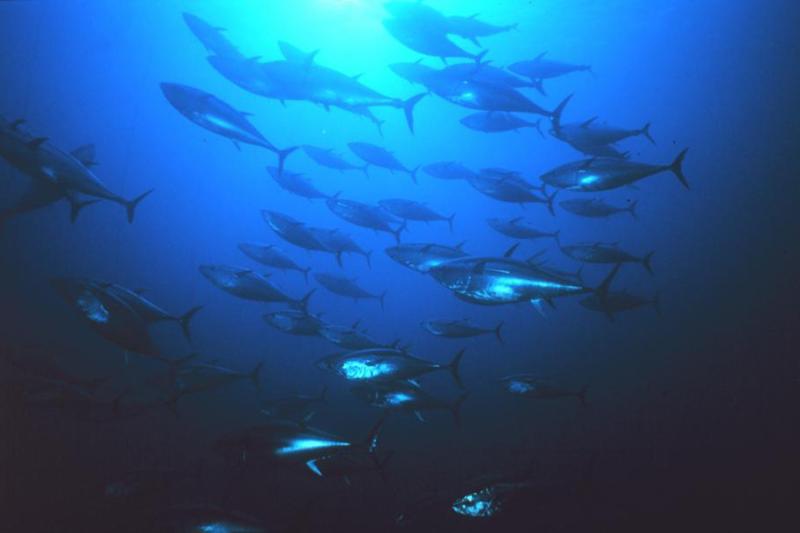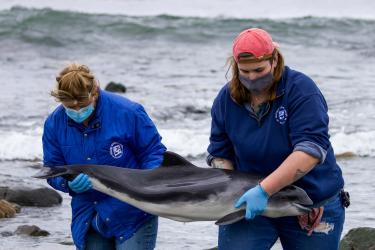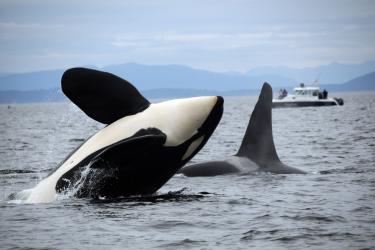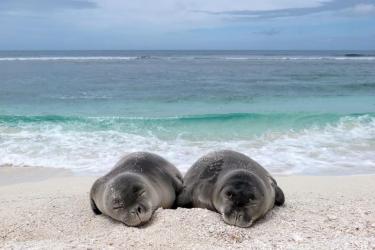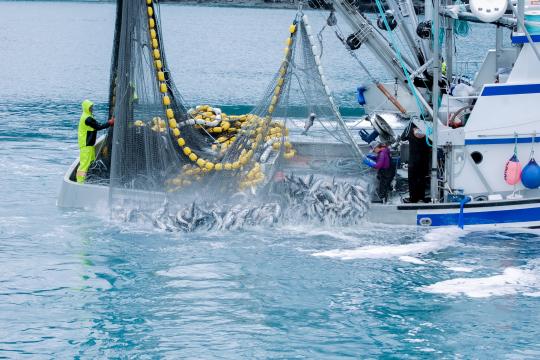The United States and other countries from around the world tackled management challenges for Atlantic tunas and sharks at the 2021 annual meeting of the International Commission for the Conservation of Atlantic Tunas (ICCAT) that concluded on November 23.
The Commission adopted new management measures to rebuild the overfished North Atlantic shortfin mako shark, increase total catch limits for Western Atlantic bluefin tuna, including a quota increase for U.S. fishermen, and several U.S. proposals to combat Illegal, Unreported, and Unregulated (IUU) fishing.
“The United States achieved the majority of its key objectives in support of the long-term sustainability of ICCAT fisheries,” said Alexa Cole, U.S. Commissioner to ICCAT and Director of NOAA Fisheries Office of International Affairs and Seafood Inspection. “These measures will immediately reduce fishing pressure across the North Atlantic and support the rebuilding process of North Atlantic shortfin mako shark, a key U.S. priority going into the meeting.”
ICCAT oversees the conservation and management of Atlantic highly migratory species, including tunas, swordfish, marlin and sharks, and adopts measures to minimize bycatch of turtles, seabirds, and other protected marine life associated with these fisheries. ICCAT’s 52 members, including the United States, share this responsibility, along with five cooperating, non-contracting parties.
“The positive outcomes from this ICCAT meeting are a reflection of the skill and energy of the U.S. delegation,” said Janet Coit, Assistant Administrator for NOAA Fisheries. “The new management measures on North Atlantic shortfin mako, the quota increase for Western Atlantic bluefin tuna, the new steps to combat IUU fishing, and a new focus on addressing forced labor are all important steps in the right direction.”
North Atlantic Shortfin Mako Shark
Commission members reached consensus in many areas, most notably a new measure for overfished North Atlantic shortfin mako shark. As a positive step toward rebuilding, this measure puts into place a two-year retention ban that will immediately reduce mortality and establishes a process to evaluate if and when retention may be allowed in the future, in line with scientific advice. It contains strong provisions to improve data reporting, and particularly, the catch reporting of live releases and fish discarded dead, by all ICCAT parties. Despite this important step forward, ICCAT’s work to end overfishing and rebuild North Atlantic shortfin mako is far from done. “The United States looks forward to advancing additional conservation measures through future ICCAT negotiations to further reduce total fishing mortality and fully rebuild this stock,” said Cole. “The use of modified fishing gear, including circle hooks to reduce bycatch mortality, is an important element we will want to discuss further in ICCAT.”
Western Atlantic Bluefin Tuna
The Commission adopted a measure for Western Atlantic bluefin tuna with a total catch limit of 2,726 metric tons, which results in a more than 5 percent quota increase for U.S. fishermen. This increased fishing opportunity is consistent with scientific advice allowing for a moderate increase in catch while having a high probability of avoiding overfishing and providing for the sustainability of the fishery. The Commission will continue working to finalize its management strategy evaluation for bluefin tuna, including hosting a series of stakeholder workshops in 2022.
Tropical Tunas
In light of new scientific advice, the Commission struck a compromise among various parties to extend conservation and management measures for tropical tunas in 2022 that include an increase in the Total Allowable Catch for Atlantic bigeye tuna from 61,500 tons to 62,000 tons and a slightly shortened Atlantic-wide closure of fishing on fish aggregating devices to protect juvenile bigeye and yellowfin tuna. “I am pleased with this outcome,” said Cole. “Negotiations on this measure were very challenging and a last minute compromise avoided an unacceptable lapse in management for the fishery.”
Illegal, Unreported, and Unregulated Fishing
In a major step to combat IUU fishing, the Commission adopted several U.S. proposals to improve fisheries monitoring, control, and surveillance, including a measure that will ensure better control of in-port and at-sea transshipment activities, when fish products are transferred from one vessel to another. The adopted transshipment reform will close existing loopholes and help prevent IUU fish and fish products from entering the global marketplace and unfairly competing with legally harvested fish. The Commission also adopted a joint proposal from the European Union and the United States to require eligible vessels to have an International Maritime Organization number in order to be included in the ICCAT authorized vessel list, and a U.S. proposal to address stateless vessels fishing in the ICCAT convention area.
The United States led efforts to improve compliance and address deficiencies in catch reporting and poor implementation of conservation measures for billfish and shortfin mako shark. The United States also led an effort to adopt a new strategic plan for compliance review, which calls for an in-depth evaluation of implementation of the minimum standards for scientific observer coverage in 2022 and implementation of North Atlantic shortfin mako measures in 2023.
Forced Labor Issues in the Seafood Supply Chain
The U.S. proposal to create a working group to improve labor standards in ICCAT fisheries was also successfully adopted. Beyond the obvious devastating human toll, forced labor allows fishers to avoid the true operational costs of responsible fisheries, leading to negative consequences for the status of the fish stocks and unfair competition on the fishing grounds and in the marketplace. The new working group will explore the issues and potential ways to address them.
Electronic Monitoring Systems
ICCAT also created a new working group on Electronic Monitoring Systems. Conditions during the past two years have demonstrated the value of expanding the use of electronic monitoring to complement human observer programs and to provide an alternative option when deployment of human observers onboard fishing vessels may not be possible. The United States has required electronic monitoring systems on all of its Atlantic pelagic longline vessels (regardless of size) since 2015, primarily to evaluate compliance with bluefin tuna and shortfin mako regulations and will continue to share its experience to help improve ICCAT monitoring measures.
Sea Turtle Bycatch
The United States and several co-sponsors continued to advocate for a proposal to mitigate the bycatch of sea turtles in ICCAT fisheries through strategies based on advice from the Commission's scientific committee, but it was not adopted. “For many years, the United States has attempted to advance sea turtle protections multilaterally with other Commission members. ICCAT’s failure to adopt comprehensive sea turtle bycatch mitigation measures stands in stark contrast to the progress made in other tuna Regional Fishery Management Organizations to protect sea turtles,” said Cole. “We will continue to work with ICCAT to adopt these protections.”
However, with U.S. support, a new Memorandum of Understanding between ICCAT and the Inter-American Convention for the Conservation of Sea Turtles establishes a framework for scientific cooperation and shared technical expertise to help address the threats related to bycatch of sea turtles in ICCAT fisheries.
